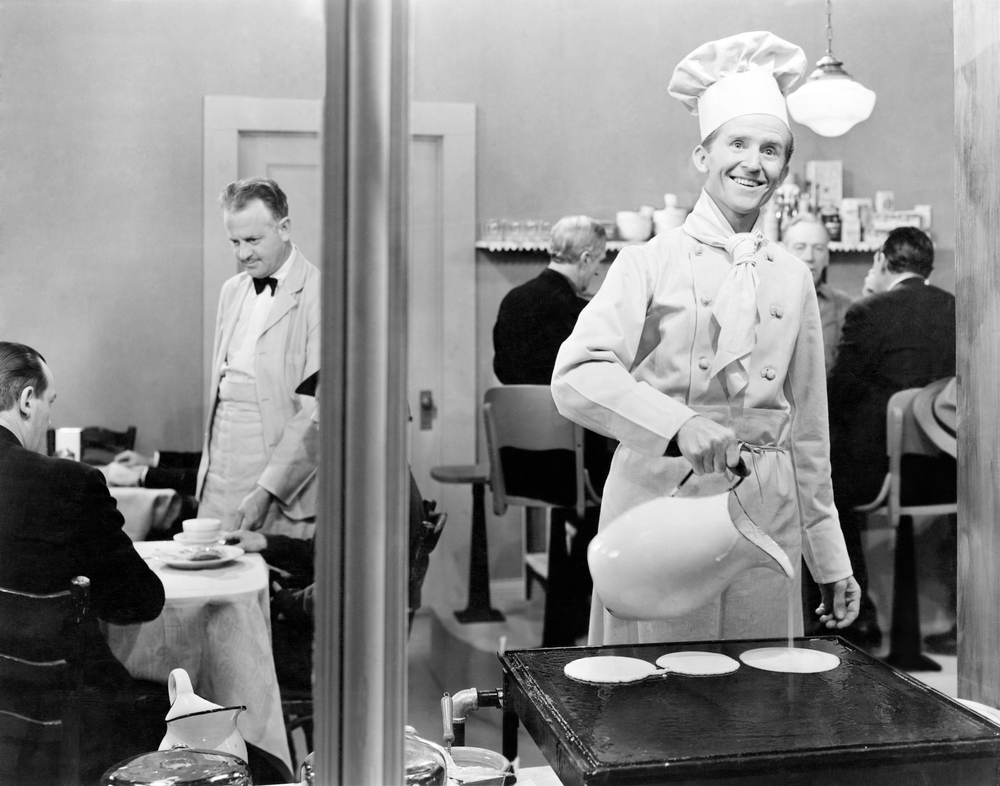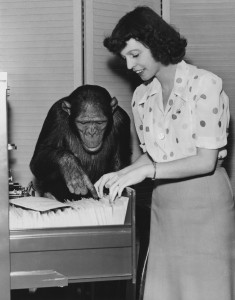This past weekend I was at Reed College in Portland, Oregon for their annual Working Weekend event. The event is designed to let students know what life will be like after college; panelists (mostly Reed alumni) discuss career paths, give advice, and provide one-on-one mentoring.
 Even though I’m not a Reed graduate, my background is similar to many of those students: I graduated with a B.A. in Religious Studies, with minors in English and Philosophy, and an M.A. in Religious Studies. I love learning for learning’s sake, thinking for thinking’s sake, and solving strange problems just for fun.
Even though I’m not a Reed graduate, my background is similar to many of those students: I graduated with a B.A. in Religious Studies, with minors in English and Philosophy, and an M.A. in Religious Studies. I love learning for learning’s sake, thinking for thinking’s sake, and solving strange problems just for fun.
You might call us nerds. That’s cool.
On Saturday evening I participated in a mentoring version of speed dating. Students read my online profile and signed up to speak with me for ten-minute increments. After the ten minutes was up someone blew a whistle and the students rushed on to their next mentor.
I met with some really smart, interesting, and creative students, many of whom were overflowing with angst. I’m not talking about a Bright Eyes sort of teen angst (is Bright Eyes still around? I feel old). I’m talking about the Greek root of angst: ἄγχω, which means “strangle.”
This is a real, deep, overpowering anxiety that these students have about finding a career as soon as they graduate in May.
On one level I can understand this. A Reed education is about $57,000 a year, including room and board, and these students and their parents want to see an incredibly fast ROI.
They want this expensive education to result in a prestigious job that will become a solid career and make them simultaneously happy and financially successful for the rest of their lives.
Who doesn’t want that?
One thing that I kept telling the students I spoke with is that the idea of finding your career right after college graduation is both unrealistic and probably a little bit stupid. Well, the idea isn’t stupid, but actually doing it is a little bit stupid, and here’s why.
Crappy Jobs Are Good For You
I hereby define a crappy job as follows: a crappy job isn’t your ideal, that is physically or mentally monotonous, that doesn’t have much opportunity for growth, and that you’ve probably taken because you’re desperate for income.
Here’s what you’ll learn from a crappy job.
How to be nice to people

From the time I was 15 until I was 27 I worked many service industry type jobs. I’d been babysitting for cash since I was twelve, but my first job, with an actual W4, was when I was 15 working for a moving company that was hired to pack up and move the main library in my town.
The month I turned sixteen I started working at a coffee shop, then as a cashier for a grocery store, where I worked until I was nineteen. Through and after college I worked as a barista, a waitress, a caterer, and I did landscaping and odd jobs for temp agencies, until I eventually started working in desk jobs.
In most of these jobs I had to learn how to be nice to people. There were so many times when rude and caffeine-deprived customers would come up to the counter where I was making lattes, and demand their drink without so much as a hello. I’d say “how are you today?” They’d reply “give me a large coffee.” No please. No thank you. Just GIMME.
I hated that. I hated being treated poorly, and I hated that I was seen as a means to an end (the end being coffee) rather than a human being. But I learned how to be nice even when I was getting very little in return.
This is how the world works. In our personal relationships we can choose our friends. I wouldn’t want to be friends with someone who doesn’t care about my well being. Unfortunately we can’t hold everyone else to those same standards.
We can’t expect every person we encounter to be kind to us, but if we’ve got some integrity then we’ll figure out how to be nice anyway. It doesn’t hurt anyone, and it’s a skill that’s incredibly valuable.
How to deal with conflict

The horrifying / wonderful thing about working in the service industry is that you will have to deal with conflict, some of it stemming from completely irrational places.
You’ll experience conflict with customers who are dissatisfied with something that you may or may not have any control over. Your boss didn’t order enough sesame bagels, and the irate customer–whom you identify only by the moniker “Triple Americano” because that’s what he orders every day–is throwing a fit and blaming you for the fact that now he won’t eat until dinner.
So what do you do? You figure it out. You deal with the conflict. It sucks, but you do it.
You may end up picking up a co-worker’s slack when she comes in hungover for the third time that week, and you’ll need to figure out how to deal with that (tell your boss? work it out between you? begin slacking yourself?).
Conflict is ubiquitous, but in a crappy job it can be even more difficult to manage. It can seem unfair, tedious, and ridiculous. But you have to deal with it. And in dealing with this everyday conflict you’ll learn how to be a better person.
How to be reliable

Not only does a crappy job teach you how to be reliable, it teaches you why to be reliable. If your coworker shows up and he’s still out of his mind on drugs from the night before (this happened to me many, many times), you’re usually pretty pissed.
Serving customers, keeping things clean and organized, and making sure everything is in the right place is even more difficult when the person who was supposed to help you do that can’t even read a clock because he’s so high (yes, this also happened to me).
Your co-workers rely on you. This is different in a service industry job or a labor job because it’s not work that can be made up on the weekend or after hours. If you don’t show up for your shift, or if you show up for your shift unable to do the work, then your coworkers suffer. A lot.
Also, if you miss too many shifts you’ll get fired. Pure and simple.
Crappy jobs teach you the value of being reliable because you know what it feels like when you can’t count on someone else. You know how it makes everyone else’s job more difficult, and you also know that not being reliable means that you won’t have a job.
How to have compassion

This is a big one for college educated, upper-middle-class millennials to embrace. If you’ve never worked a crappy job then you have no idea what the world is like for most people out there.
This entire blog post is written from a privileged perspective. I’m writing under the presumption that a crappy job is a brief stopover on your way to a better career–one that pays well above minimum wage, one that allows you upward mobility, one that will create a stable life for you and your (future) family.
There’s been quite a bit of research lately that reaffirms the value of a college education. Despite the devastating effects of student loans, people without a college education earn only 62% of what college graduates earn.
For college graduates a crappy job is a stepping stone. For others a crappy job is often a longterm reality.
From 2003 to 2005 I worked for a national organization that worked to mobilize low-income families across the United States to make their neighborhoods better. Its employees were a mix of recent college graduates with a passion for philanthropy and people who had lived in those communities their whole lives and were deeply invested in making them better.
I remember at an annual conference for the organization a woman spoke out against “playing in the ghetto.” She felt that these young college graduates were simply tourists in impoverished neighborhoods, and they would never understand what it meant to be part of her community.
This is true. If your crappy job is just something you do until you get a “real” job, you’ll never really get it.
However, living paycheck to paycheck, struggling to make ends meet, and working your ass off day after day for very little reward will make you more compassionate.
You’ll think twice before stiffing someone on a tip. You’ll remember to say please when you order your $5 espresso drink. And you’ll know that no one deserves to be treated as inferior to anyone else, regardless of their occupation.
I Like to Hire People With Crappy Jobs on Their Resumes

If the only work experience you have is with internships for companies just like mine, then I don’t want to hire you. First of all, internships are (or should be) an extension of your education, not an alternative to actual work.
I’m not saying that some internships aren’t work, but instead of fetching coffee for a couple executives or updating a company’s Yelp profile, I want to know that you’ve worked hard.
Having crappy job experience shows me that you’ve learned how to be nice to people even if you despise them, that you’ve worked on ways to deal with conflict, that you’ve had to be reliable in the face of tedium, and that you know enough to be compassionate.
These are skills that can be learned in places other than crappy jobs, but it’s the crappy jobs that give you context.
 People who’ve had crappy jobs don’t have the same sense of entitlement as those who haven’t. If you believe that you should never have to have a crappy job because you’re somehow above that, then you could use a dose of humility.
People who’ve had crappy jobs don’t have the same sense of entitlement as those who haven’t. If you believe that you should never have to have a crappy job because you’re somehow above that, then you could use a dose of humility.
Instead of moving back in to your parents’ basement when your dream job as a creative director at an ad agency doesn’t work out right out of college, apply at a coffee shop. See if a department store is hiring. Paint houses. Do landscaping. But work.
Get a real job, even if it’s crappy. Support yourself on that for a while. Keep building up skills and experience in whatever it is you’d like to do for a career. Teach yourself to code after work. Take free classes in design. Begin writing blogs. Don’t stop learning, but don’t stop working either.
If you’re afraid an employer won’t be interested in someone who spent a year and a half waiting tables at a gross suburban chain restaurant, then you’re wrong. Every bit of work experience counts. Every job counts. Especially the crappy ones.
Have something to say?